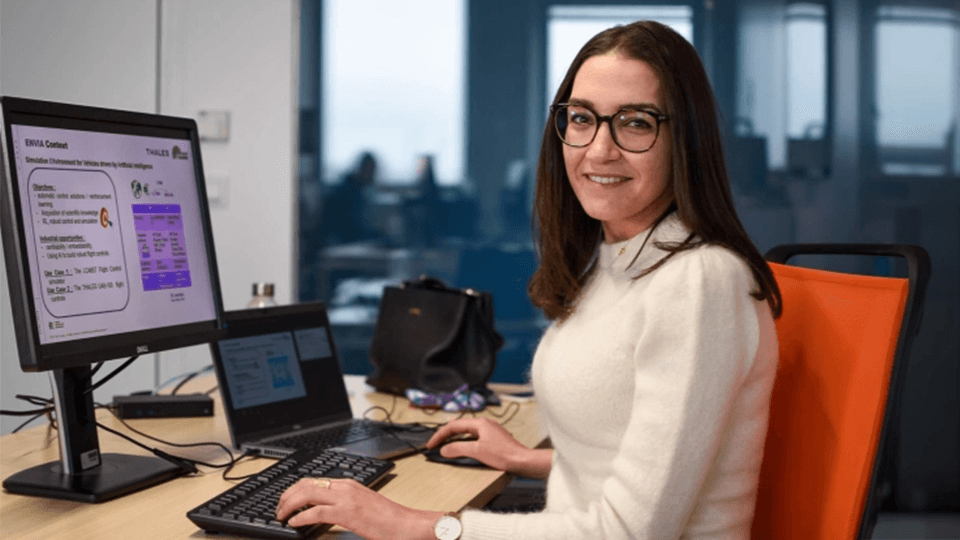Zeineb, an engineer and artificial intelligence project manager seconded by Thales, looks back on her career and experience at the IRT Saint Exupéry. Between project management and professional development, she recounts the highlights of her two years at the IRT. Interview.
Can you tell us a bit about your background?
My interest in mathematics led me to graduate from the University of Sfax in Tunisia in 2012, as a computer engineer. I would say that it was at that point that my passion for aeronautics began, or rather that aeronautics chose me. My end-of-studies placement was at the Laboratoire d’Automatique, de Mécanique et d’Informatique Industrielles et Humaines in Valenciennes, developing a simulator for supervising avionics tasks for Airbus Helicopters. I’ve always been attracted to and wanted to go into technical professions. So it was natural that I went on to do a thesis, which was completed in 2018 at the University of Valenciennes, on optimisation methods and graph algorithms, i.e. flight planning taking into account different parameters linked to the mission and the aircraft. I then joined Thales in Toulouse as an algorithms engineer working on research subjects relating to the optimisation of flight operations and the modelling of aircraft performance. I also followed European projects such as Clean Sky 2. My story with the IRT Saint Exupéry began in 2021.
You’re joining the IRT Saint Exupéry as project manager. Can you tell us about the Envia project?
At the end of 2021, Thales offered me a secondment to the IRT Saint Exupéry, to be project leader on Envia, an exciting project involving the construction of control laws with reinforcement learning. The recognition of the IRT for its excellence in research, and my desire to tackle low TRL (Technology readiness level) exploratory research topics, incorporating artificial intelligence, led me to join the adventure on 31 January 2022.
The aim of the Envia project is to create robust control laws incorporating artificial intelligence. Industry and academia are involved, with the participation of Thales and ISAE SUPAERO. The use of artificial intelligence could improve an aircraft’s ability to interact with its environment and extend its field of use, thereby lightening the pilot’s mental load.
At Thales, we are participating in the development of robust control laws using artificial intelligence on the UAS100 UAV, to enable it to better anticipate weather phenomena and thus increase its performance. An engineer from the IRT Saint Exupéry, Valentin Guillet, has been seconded to Thales’ avionics business to play an active role in the project.
Can you tell us about your experience at the IRT Saint Exupéry?
It’s been a great experience for me. Firstly, from a professional point of view, because during my first ten years on the job, I was mainly in contact with technology. At the IRT, I was able to broaden my know-how as a project manager: management, legal, financial, coordination and negotiation skills. But also on a human level. The IRT is very diverse, both in terms of the people it employs and the mix of projects. That’s a real asset, both internally and for the research community, because it helps us to move forward together to achieve common goals, with different angles of vision. I think that Thales has given me the opportunity to have a very constructive experience at the IRT, enabling me to grow in my professional career and move on to a new position.
Is there anything you would like to share with us about your experience at the IRT?
During the Envia project, we had the opportunity to extend the project at Thales, in particular the ENVIA + project planned until the end of 2024. The plan is to build control laws in a simulated environment, followed by a transfer from simulation to reality. This is a major achievement for the project, given the difficulty of carrying out tests in an operational environment. It is also an important technological issue because, as far as we know, there is no theory that can guarantee that what is learned by reinforcement in the simulated environment will work in reality. This is why we are working with the IRT on this subject: to break this scientific and technological barrier, and to transfer it to industry.
My secondment ends at the beginning of 2024. For my part, I’m leaving for new adventures at Thales in the Paris region as head of algorithms and performance. I’ll never forget the formative years I spent at the IRT.
A final word?
The integration of artificial intelligence into critical avionics must first and foremost meet safety and confidence objectives. I am convinced that it will play an active part in meeting the challenges of sustainable aviation in the long term.
Finally, I would say that the links between academia and industry have always existed on mature studies. The IRT bridges the gap between these two worlds on the scale of research that is still exploratory, in order to anticipate new technologies conducive to tomorrow’s aviation. Going through the IRT also means realising the need to develop upstream research to prepare for the future and respond to environmental and flight safety issues.


